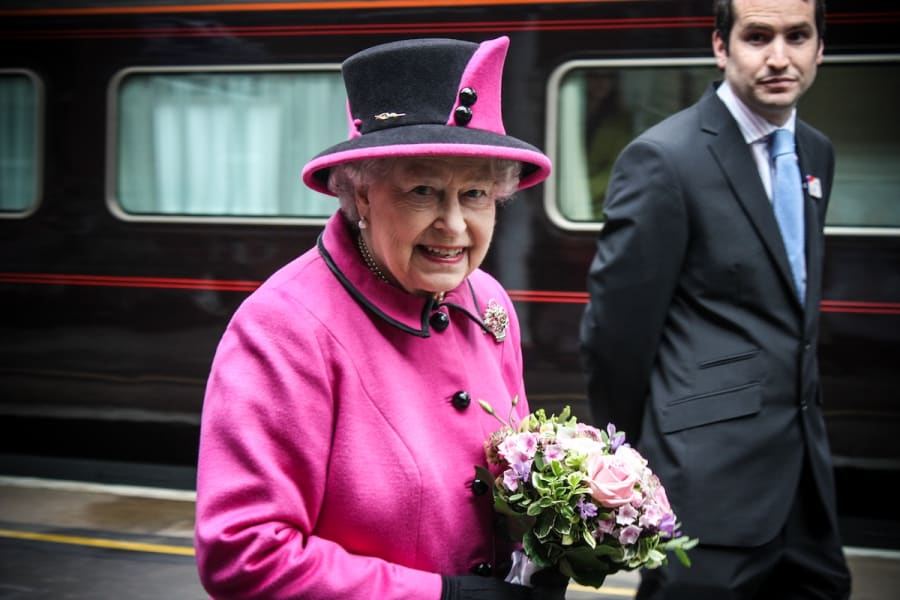Israeli leaders praise Israel-UK relations under Queen Elizabeth II who passed away this evening
Nevertheless, the queen, 96, never visited Israel despite visiting several Arab countries in the Middle East

Israeli leaders offered condolences for Queen Elizabeth II – the longest serving monarch in Britain’s history – who passed away at the age of 96 on Thursday evening.
The queen had been under medical supervision at Balmoral Castle in Scotland, where members of the royal family gathered earlier in the day to say their final goodbyes.
Though the royal family has much history in the Holy Land, Elizabeth had never visited Israel.
Nevertheless, Israel and the United Kingdom have good relations and condolences came pouring in from across Israel for the queen. Israeli President Isaac Herzog called her death “the end of an era.”
“Queen Elizabeth was a historic figure: she lived history, she made history, and with her passing she leaves a magnificent, inspirational legacy,” he said. “Throughout her long and momentous reign, the world changed dramatically, while the Queen remained an icon of stable, responsible leadership, and a beacon of morality, humanity and patriotism. In her life and in her service to her people, the Queen embodied a spirit of integrity, duty and ancient tradition.”
HM Queen Elizabeth II was known far and wide simply as The Queen. Her passing is the end of an era. Together with the Israeli people, I grieve her loss and extend my deepest sympathies to the British people and all nations of the Commonwealth, who have lost their matriarch. pic.twitter.com/SvTlMyTSyC
— יצחק הרצוג Isaac Herzog (@Isaac_Herzog) September 8, 2022
His father, Chaim Herzog, was born in Dublin and had met Elizabeth several times.
“Her fond welcome and warm hospitality left a profound impression down the generations,” he said.
Elizabeth II ascended to the throne 70 years ago in 1952. She was born in London to King George VI and Queen Elizabeth. Her father had become king in 1936 upon the abdication of his brother, King Edward VIII – a move that made Elizabeth his heir.
At the age of 25, when her father died, Elizbeth became queen regnant of seven independent Commonwealth countries, including the United Kingdom, Canada, Australia, New Zealand, South Africa, Pakistan and Sri Lanka.
She married the Duke of Edinburgh, Prince Philip, in 1947, and were together for 73 years until the prince passed away last year at the age of 99. They had four children: Prince Charles, Princess Anne, Prince Andrew and Prince Edward.
During her rule, the queen welcomed 15 prime ministers with whom she held weekly “private audience” conversations. Liz Truss, who won the Conservative party leadership election on Monday, became the last prime minister of England during the course of the queen’s reign. Her first, was Winston Churchill who was born in 1874.
In her role as a monarch, Elizabeth II visited over 100 countries at the request of the government. She welcomed hundreds of world leaders, ambassadors and dignitaries to England as well.
But she never paid a visit to Israel, despite having visited other countries in the region, including Egypt, Jordan, Kuwait, Bahrain and Saudi Arabia. Other British royals have visited the Jewish state, Including her late husband the Duke of Edinburgh, her sons Charles and Edward, and her grandson Prince William. The only official visit, however, was that of William in 2018.
The Duke of Cambridge became the first senior member of the British royal family to make a stop in Israel as part of an official royal tour, since its founding in 1948.
Prince Philip made a historic unofficial visit to Israel in 1994 to honor his mother, Princess Alice of Greece, who is buried on the Mount of Olives in Jerusalem. He was invited by the Yad Vashem Holocaust Museum for a ceremony in her memory, as a ‘Righteous Among The Nations’ who helped save Jews during the Holocaust. Elizabeth and Philips’ son, Prince Charles, attended the funeral of former Israeli Prime Minister Yitzhak Rabin in 1995.
Over the years, Israeli presidents have sent repeated invitations to the queen, which have been quietly rejected. Israel’s former President Reuven Rivlin was the last to extend the invitation around the centenary of the Balfour Declaration – a public statement issued by the British government in 1917 during World War I, which recognized the Jewish people's right to a national home in the land of Israel.
Every official visit of the royal family must receive the approval of the British government. For many years, Israelis believed that the reason behind the queen’s rejection was Britain’s fear of an Arab boycott. The official approach of the U.K. has been that as long as the Arab-Israeli conflict stands, such a visit cannot take place. Yet Elizabeth refused invitations even after several Arab countries made peace with Israel.
Israeli Prime MInister Yair Lapid said Elizabeth "leaves behind an unparalleled legacy of leadership and service."
On behalf of the Government and people of Israel, I send my condolences to the Royal Family and the people of the United Kingdom on the death of Her Majesty Queen Elizabeth II.
— יאיר לפיד - Yair Lapid (@yairlapid) September 8, 2022
She leaves behind an unparalleled legacy of leadership and service.
May her memory be for a blessing. pic.twitter.com/ZWm26wiVKx
Israel's Defense Minister Benny Gantz said that under the queen "U.K.-Israel relations flourished. My thoughts are with the U.K. today."

The All Israel News Staff is a team of journalists in Israel.












